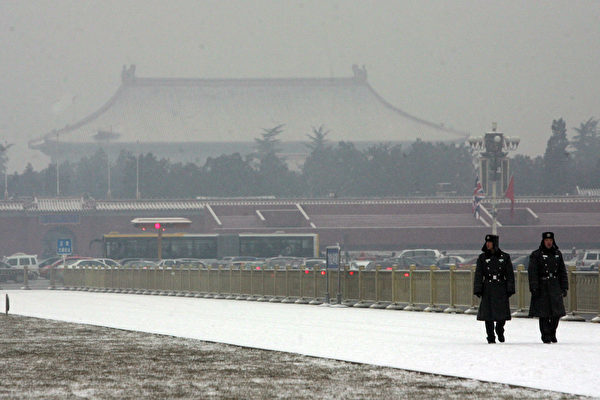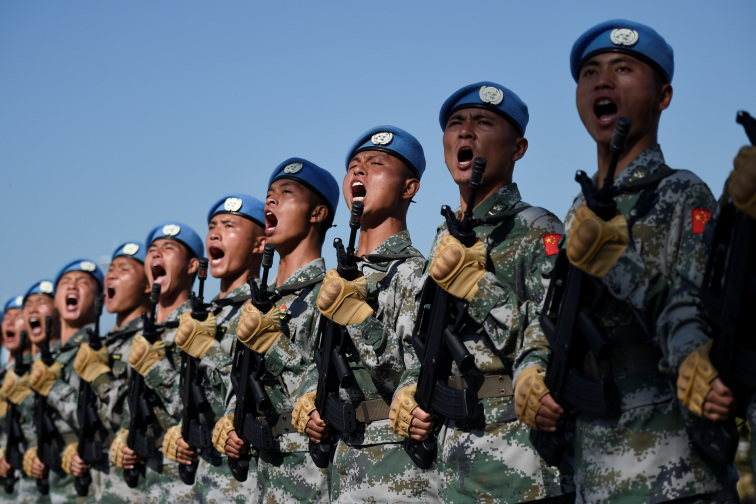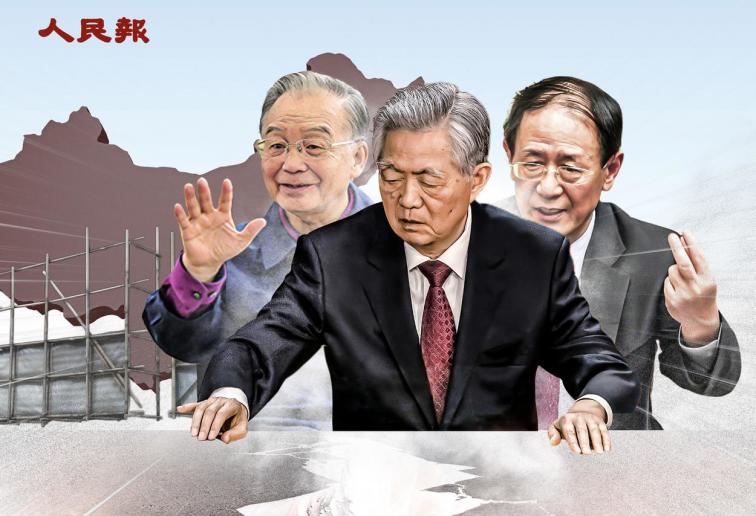Zhang Youxia, during his speech on stage, was full of assertiveness, displaying the demeanour of a top military boss. Military officers below the stage were taking notes with their heads down, showing complete submission. (video screenshot).
[People News] On August 26, not long after returning from Tibet, Xi Jinping and his wife Peng Liyuan met with Cambodian King Sihamoni and Queen Mother Monineath at Zhongnanhai. On the same day, the CCP military held an academic symposium in Beijing to commemorate the 80th anniversary of the victory in the War of Resistance. Zhang Youxia, Vice Chairman of the Central Military Commission and Politburo member—who did not accompany Xi on his trip to Tibet—attended the symposium and delivered a speech.
According to state media Xinhua’s report, in his speech, Zhang Youxia mentioned “Chairman Xi” only twice: once at the beginning, saying “with the approval of Chairman Xi Jinping,” and again when urging “study and implementation of Chairman Xi’s” instructions. Beyond that, Zhang repeated the falsehood that “the CCP was the mainstay of the resistance war,” stressing the need to “strengthen the Party’s command over the gun,” to “truly study, truly understand, truly believe in, and truly apply Xi’s thought,” and to “ensure the people’s army always heeds the Party and follows the Party”—all empty, formulaic phrases.
As for how many CCP generals and senior officials—including Zhang Youxia—actually “truly study, truly understand, truly believe in, and truly apply Xi’s thought,” those inside the system know best. Because they say these things year after year, month after month, day after day, it has long since become a habit. The psychological split has also become second nature.
In the 1970s, New York Times Moscow correspondent Hedrick Smith, in his book The Russians, described the peculiar mentality of Soviet officials. He observed that hardly anyone truly believed in communist ideology anymore—not even Soviet leaders themselves. This was borne out after the collapse of the USSR. In her memoirs, Brezhnev’s niece Lyuba confirmed Smith’s observation, recalling Brezhnev once told his brother: “Communism? That’s just empty talk to fool the people.”
In the eyes of the Soviet citizens Smith interviewed, the real purpose of their leaders’ endless ideological propaganda was not belief, but rather to test loyalty and safeguard their own power—and only for the sake of maintaining that power. As for officials at all levels, even though they did not believe in the official ideology and were inwardly repulsed by it, each continued to play their part in public: supporting the leader, repeating his clichés.
There is no doubt that over the past three decades, the mentality of CCP officials has been the same. To protect their vested interests and to cover up internal shifts, they continue to feign loyalty. Since last year’s CCP Third Plenum, when rumours of Xi Jinping’s stroke began circulating, Zhang Youxia—who in practice has gained the backing of party elders and seized control of the military—mentioned “Chairman Xi” twice in his speech precisely for this purpose: to conceal the secrets the CCP does not want the outside world to know.
Yet, although Zhang referred twice to “Chairman Xi,” he did not mention “2442” or the “implementation of the Chairman of the CMC responsibility system.” He also did not convey greetings to veteran soldiers on behalf of “Chairman Xi.” In fact, this omission revealed the hidden truth about who really controls the military.
For comparison: at the military’s symposium commemorating the 70th anniversary of the victory in the Resistance War on August 25, 2015, then–CMC Vice Chairman Xu Qiliang attended and spoke. He began by explicitly conveying, “on behalf of Chairman Xi Jinping and the Central Military Commission,” the highest respect to veteran soldiers and comrades who contributed to victory. He then cited Mao, Deng, Jiang, and Hu’s views on the war, and separately elaborated that “Chairman Xi personally participated in major commemorative events, delivered many important speeches, and profoundly expounded on the historical position, great significance, and basic lessons of the Resistance War,” saying that Xi’s exposition “provides a powerful ideological weapon for the study, research, and promotion of the war.”
Xu also spoke of Xi’s “China Dream, Strong Military Dream,” stressed the need to “thoroughly implement the spirit of the Gutian all-army political work conference, uphold the Party’s absolute leadership over the army, and thoroughly eliminate the poisonous influence of Guo Boxiong and Xu Caihou”—all to display loyalty to Xi.
Compared with Xu Qiliang’s speech ten years ago, Zhang Youxia’s recent remarks about “Chairman Xi” were far more perfunctory. Compared with Zhang’s speeches during troop visits earlier this year at the Lunar New Year, the tone has also been further downgraded.
In February this year, before the traditional New Year, both CMC Vice Chairmen Zhang Youxia and He Weidong visited troops. Zhang visited an information support unit in Shenyang, while He went to an air force radar brigade and a transport-rescue aviation brigade in Beijing. When Zhang spoke, he said he was conveying greetings on Xi’s behalf, emphasised “resolutely implementing Chairman Xi’s decisions and deployments,” and called for “truly studying, truly understanding, truly believing in, and truly applying Xi Jinping’s thought on strengthening the military.” Yet the real core of his message was the phrase “further forging the military’s obedience to Party command.”
By not mentioning “2442” or the “CMC Chairman responsibility system,” and by openly showing no concern about skipping Xi’s southern and Tibetan tours, Zhang Youxia has already confirmed the circulating rumours. He merely continues to go through the motions, putting on a performance.
(First published in People News) △











News magazine bootstrap themes!
I like this themes, fast loading and look profesional
Thank you Carlos!
You're welcome!
Please support me with give positive rating!
Yes Sure!